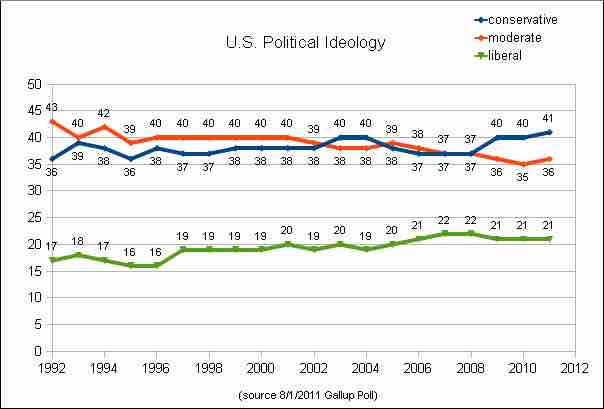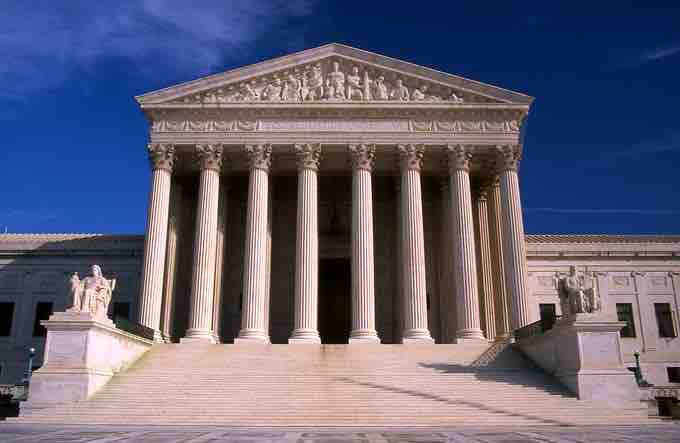What Are American Political Values?
Values represent a society's shared convictions about what is just and good. Most often, Americans claim to be committed to the core values of individualism and egalitarianism. Core American political values are vested in what is often called the American creed. The creed, which was composed by New York State Commissioner of Education Henry Sterling Chapin in 1918, refers to the belief that the United States government is "by the people, for the people, whose just powers are derived from the consent of the governed. " The nation consists of sovereign states united as "a perfect Union" based on "the principles of freedom, equality, justice, and humanity. "
American exceptionalism is the view that America's successful development as a nation has contributed to its special place in the world. It is the conviction that the country's vast frontier has offered boundless and equal opportunities for individuals to achieve their goals. Americans feel strongly that their nation is destined to serve as an example to other countries. They believe that the political and economic systems that have evolved in this country are perfectly suited in principle to permit both individualism and egalitarianism.
Additionally, the American creed also includes patriotism: the love of one's country and respect for its symbols and principles. The events of 9/11 ignited Americans' patriotic values, resulting in many public displays of support for the country, its democratic form of government, and authority figures in public-service jobs, such as police and firefighters.
Another core American value is political tolerance, the willingness to allow groups with different ideologies to exercise their constitutionally guaranteed freedoms, such as free speech. While many people strongly support the ideal of tolerance, they often are unwilling to extend political freedoms to groups they dislike. People acknowledge the constitutional right of racist groups, such as skinheads, to demonstrate in public, but will go to great lengths to prevent them from doing so. Democratic political values are among the cornerstones of the American creed.
Americans believe in the rule of law which explains the idea that government is based on a body of law, agreed on by the governed, and is applied equally and justly. The Constitution is the foundation for the rule of law. The American creed also encompasses the public's high degree of respect for the American system of government and the structure of its political institutions .
Capitalist economic values are also a part of American values. Capitalist economic systems emphasize the need for a free-enterprise system that allows for open business competition, private ownership of property, and limited government intervention in business affairs. Underlying these capitalist values is the belief that, through hard work and perseverance, anyone can be financially successful. The emphasis on the lone, powerful person implies a distrust of collective action and of power structures such as big government, big business, or big labor. The public is leery of a few large companies having too much concentrated power. The emergence of the Tea Party, a visible grassroots conservative movement that gained momentum during the 2010 midterm elections, illustrates how some Americans become mobilized in opposition to the "tax and spend" policies of big government.
Translating Political Values into Political Ideologies
While there are various components to fundamental American political values, not all Americans agree on which exactly the most important values should be . People believe that, when making policies, certain values should be emphasized and others deemphasized. People then choose a political ideology that most closely matches their values. These ideologies capture what they believe the scope and purpose of government should be, as well as the balance between individual freedom and collective equality.
Generally, peoples' values about the scope and purpose of government can be translated into three main political ideologies: liberals, conservatives, and moderates. People who value change and a greater emphasis on collective equality tend to relate to the ideology of liberalism. Liberals support more government intervention to promote economic equality, and believe the government should have more of a say in peoples' lives.
Contrastingly, people who value tradition and the status quo will relate more to conservatism. Conservatives favor less government intervention (like the Tea Party), and more individual freedom in economic activities (which can subsequently mean a belief in less collective equality). Moderates hold an ideology somewhere in between liberalism and conservatism.

Political Ideology Trends
As this chart illustrates, not all Americans agree on which should be the predominant political values and ideologies. Also in this chart, it is evident that people align with different ideologies at different points in time.

Equal Justice under Law
The inscription on the front of the United States Supreme Court building reads, "equal justice under law. " This phrase emphasizes the centrality of the rule of law in American political values.